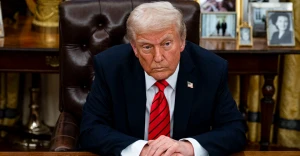
Ukrainian-Polish border unblocked: are protests to be expected in future?
Since late April, there has been a noticeable improvement in the situation on the Polish-Ukrainian border, with large protests ceasing, although the barricades are still there and may again become the epicenter of new crises in the future
On Monday, April 29, Hrebenne-Rava-Ruska, which remained the only checkpoint where Poles continued to block truck traffic, was unblocked. Border guards reported that Polish farmers had stopped blocking the movement of trucks in front of the checkpoint.
"Customs clearance and passage of trucks across the border in both directions is carried out as usual. At the same time, according to available information, trucks transporting grain crops will not be allowed to enter Poland. This type of cargo can only move through Poland in transit mode," Ukraine's Border Guard Service wrote.
Perhaps the main reason for the stabilization of the situation on the border was finally the active actions of the government of Polish Prime Minister Donald Tusk and his recent statement (mid-April) that Polish authorities would act in such a way as to make the checkpoints passable. Although he expressed the hope that "direct means of coercion" would not be needed, it seems that these words made an impression on the protesters, who until recently had been regularly blocking the border.
Espreso will answer all the questions you may have about the blocking of the border by Polish protesters.
How many checkpoints are there on the Ukrainian-Polish border?
The border between Ukraine and Poland is 535 kilometers long and is the busiest and is considered Kyiv's transport window to the EU. The total number of checkpoints on the Ukrainian-Polish border is 17. These include 8 road checkpoints and 9 railroad checkpoints. Of these, 10 checkpoints are authorized for freight traffic (plus three more small trucks).
Why did the blockade of the Ukrainian-Polish border begin?
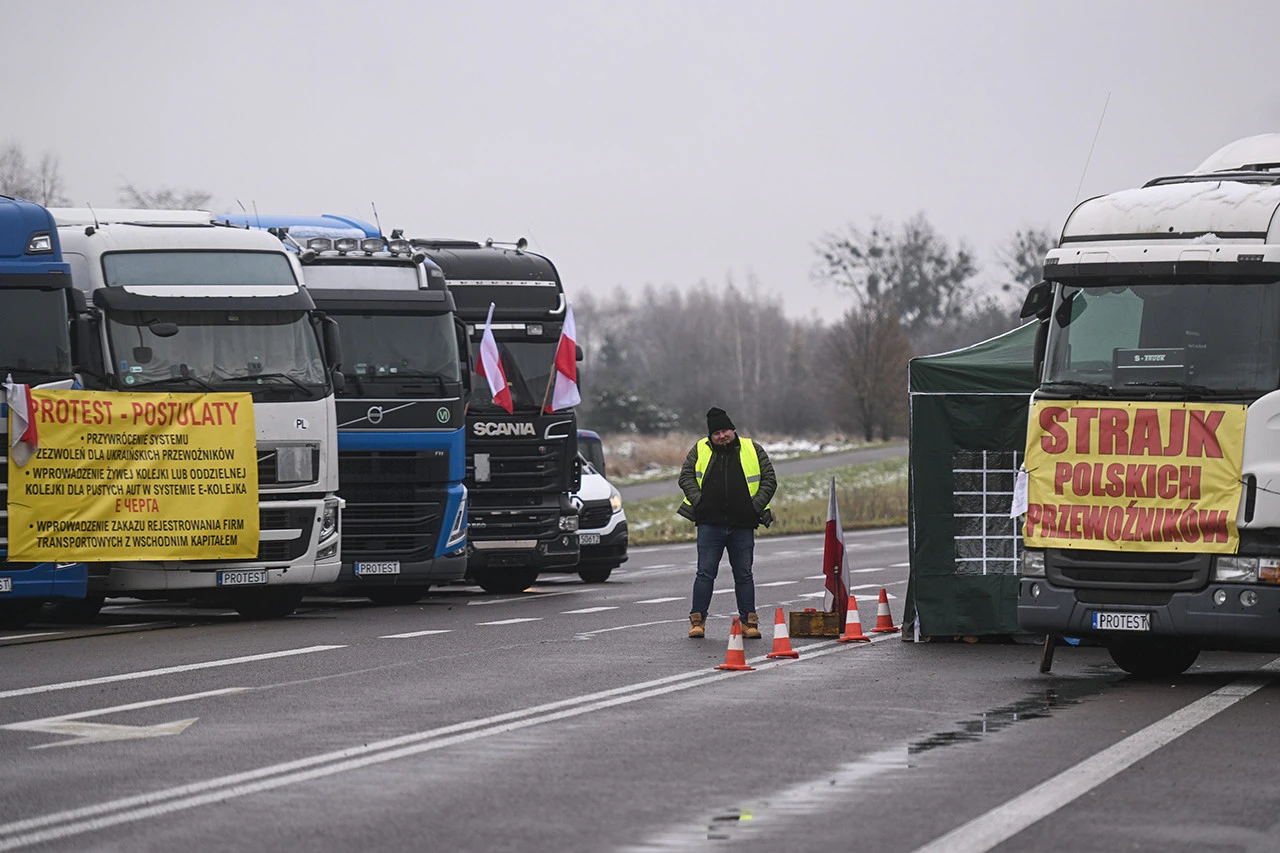
Photo: Getty Images
The main argument of the Polish protesters is that Ukrainian agricultural goods have allegedly flooded Poland and this has lowered prices for Polish products. Polish carriers also complain about "unfair competition" against their Ukrainian counterparts, as they allegedly offer cheaper services and take away their jobs. As evidence, Polish protesters claimed that in 2023, Ukrainian trucks crossed the border 5 times more than before the full-scale war.
Why? Because since the beginning of Russia's full-scale war against Ukraine, Kyiv has been granted a temporary transport visa-free regime and the abolition of duties on Ukrainian goods in the EU. This was done to help the Ukrainian economy, which had lost air travel and, to a large extent, sea travel. As a result, Ukrainian grain was mostly transported by truck.
In other words, the main motivation of the protesters is the fear of competition with Ukrainian food (primarily grain) and Ukrainian carriers (truckers). Moreover, these fears have been exaggerated by pro-Russian forces in Poland to make Ukrainians and their products the enemy.
What are the Polish protesters demanding?
The main demand of the Polish protesters is to ban imports of Ukrainian agricultural products and to cancel the transport visa-free regime for Ukrainians. Subsequently, another demand was added to this one - Poland's abandonment of the so-called Green Deal.
The Green Deal is a series of policy initiatives by the European Commission aimed at the environmental transformation of the European Union, including the use of new, much more expensive biological products, genetically diverse breeding systems and methods, and part of the money that the EU used to send to farmers will now go to climate measures. This led to protests not only by Polish farmers but also by farmers in other EU countries.
Who is blocking the border?
There are two main groups: transporters and farmers. In fact, blocking the border was definitely not a mass phenomenon at first. In the first months, the border was blocked by only a few small carriers and certain groups of them, and the leader of the process was a representative of the Confederation party, which at one time opposed Ukraine's accession to the EU.
Later, in December-January, Polish farmers and their trade unions joined the action, deciding to advance their demands for better agricultural business.
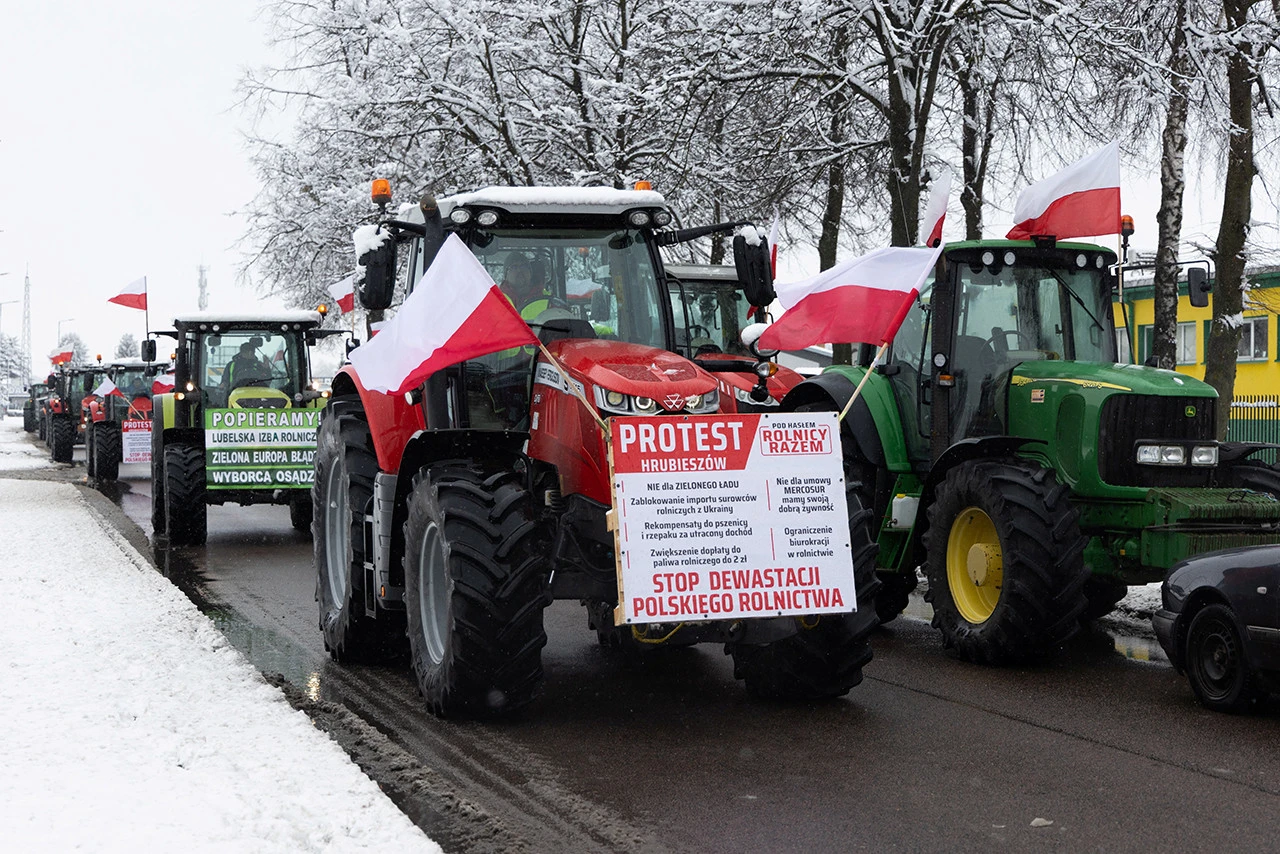
Photo: Reuters
Alina Bondarchuk, head of the Center for Collecting and Monitoring Disinformation, directly stated that the farmers' actions in Poland were funded by the Kremlin. MEP Bernd Lange also expressed suspicion about the Russian trace of the border blockade.
How long has the border blockade lasted?
The blockade began on November 6, 2023, and has been going on for over six months. Back then, several dozen owners of Polish transport companies blocked the three main checkpoints on the Polish-Ukrainian border (Krakovets-Korczowa, Yahodyn-Dorohusk, Rava-Ruska-Hrebenne) in protest against “unfair competition from Ukrainian transport companies.”
In just two weeks, several thousand trucks were stuck at the Polish border. And the time it took for one truck to cross the border increased from the initial few hours to one week. Truck queues began to reach tens of kilometers.
From the end of November, new checkpoints were added, which were permanently blocked by protesters. The actions were announced and ended, but tension was constantly felt at the border because of the protesters' actions. And on February 9 this year, the Poles began the so-called national strike. Then the Polish farmers' union Solidarity joined the protests.
"Our patience has run out. Brussels' position on the last day of January 2024 is unacceptable for our entire agricultural community. In addition, the passivity of the Polish authorities and statements about cooperation with the European Commission and statements about compliance with all decisions of the European Commission on imports of agricultural and food products from Ukraine leave us no choice but to declare a general strike," the union said in a statement.
At their peak, the protests completely blocked all checkpoints on the Ukrainian-Polish border. For example, this happened on February 20, 2024. In the evening of February 20, Polish protesters eased traffic restrictions near the border with Ukraine at two checkpoints.
In fact, the strike ended only on April 22, when Polish farmers unblocked truck traffic in front of the main Dorohusk-Yahodyn cargo checkpoint.
On April 25, it became known that the Polish government had approved a decree defining a plan to help Polish farmers and that the blockade was ended on April 29 at the Hrebenne-Rava-Ruska checkpoint.
Although Polish protesters have not officially announced that they have reached a compromise with the authorities and will no longer block the border, there are currently no queues at the border.
How did the Polish authorities react to the border blockade?
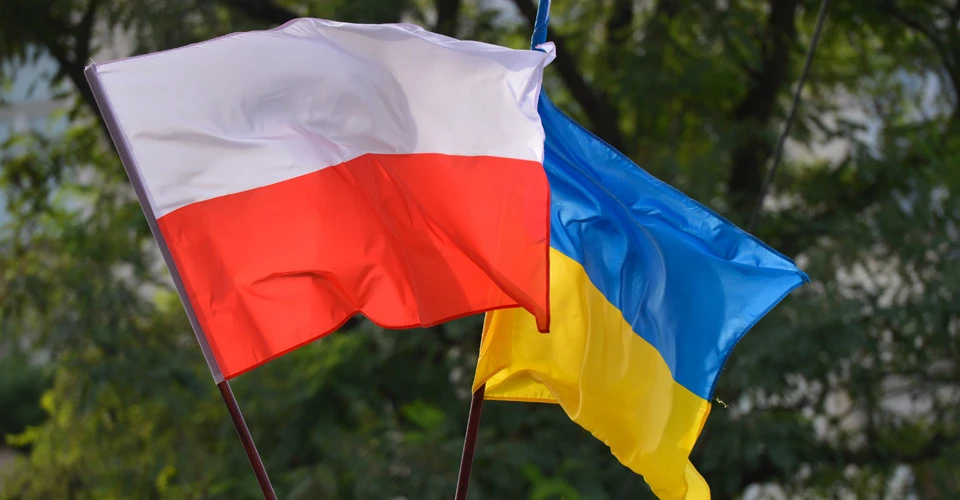
Photo: gettyimages
From the first days of the blockade, the Polish government tacitly supported the protesters' actions. In particular, at the end of November, the then-Prime Minister of Poland, Mateusz Morawiecki, officially supported the return of permits for Ukrainian drivers, i.e., the return of the pre-war system that was beneficial to the Poles. However, the European Commission stated that it could initiate criminal proceedings against Poland if the Polish authorities did not resolve the issue with the carriers regarding the blocking of the borders. But the Polish government of the time was not interested in this.
Although the more pro-Ukrainian Donald Tusk took over as Polish prime minister in December 2023, no concrete steps were taken to unblock the border until February 2024. On February 20, Polish Minister of Agriculture Czesław Siekierski told farmers that the ministry wanted to develop a bilateral agreement with Ukraine that would expand the scope of protection for the Polish market. That's when the Polish government began negotiations with the protesters, which were unsuccessful.
Despite his encouraging statements, Donald Tusk was not looking for a quick fix to the conflict, as this could have shaken his position as prime minister, as he was at the top thanks to coalition agreements with different parties with different views.
Polish Prime Minister Donald Tusk has repeatedly called for the border to be unblocked, but the words spoken on April 18, 2024, proved decisive.
"We cannot in any way harm Ukraine in a situation where the fate of the war is being decided. I don't think anyone decent in Poland wants to weaken Ukraine today, so for now I'm counting on discretion and the rejection of this form of protest," Tusk said, adding that the government is ready to provide further forms of assistance to those farmers who have lost some of their income.
It is likely that the Polish authorities did manage to find an understanding with the protesters through promises of additional assistance, as they stopped blocking the border in a few days. However, the situation is still not resolved, and the border blockade has become a powder keg that only needs a spark to ignite. For example, this weekend (April 27-28), information was spread on social media about the alleged blocking of vehicles at the border that were intended for the Ukrainian army.
How did the Ukrainian authorities react to the border blockade?
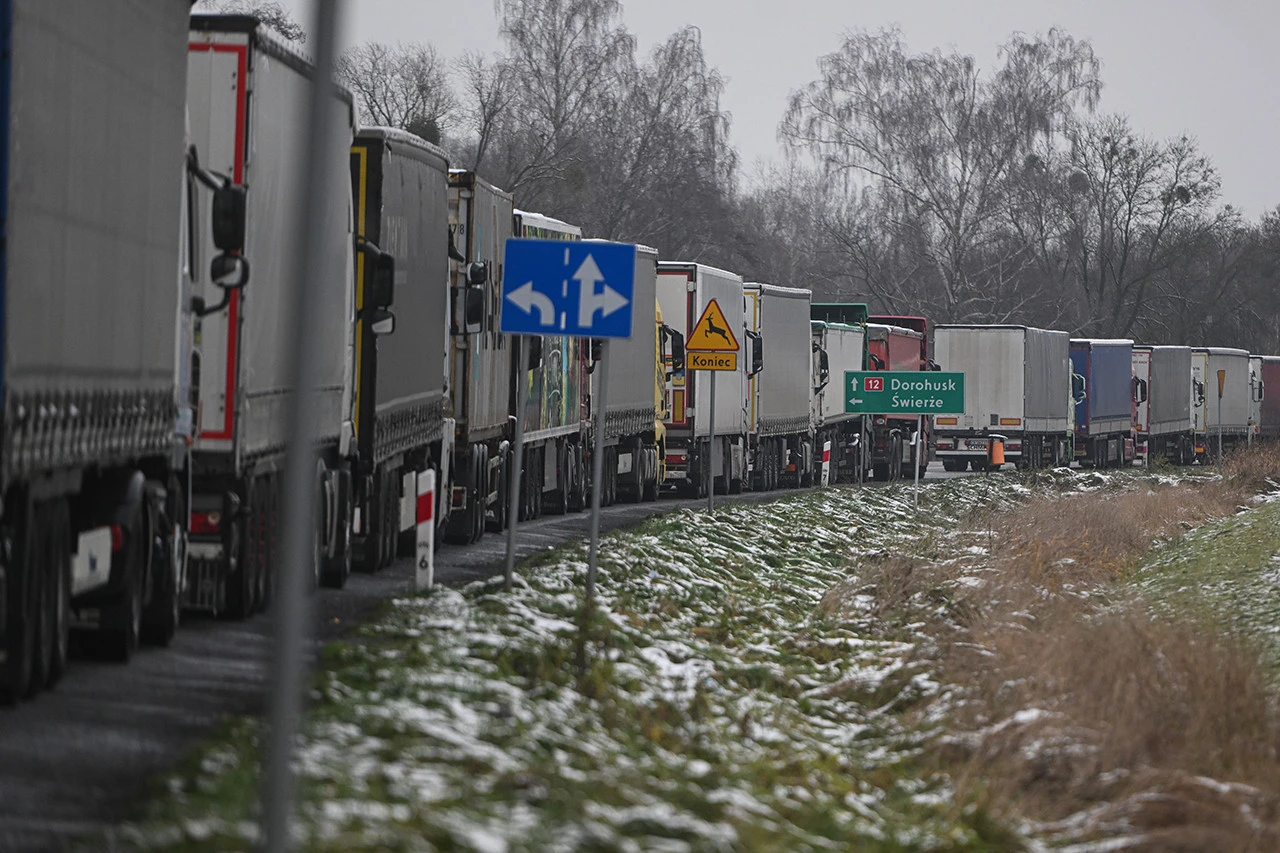
Photo: Getty Images
From the very first days, the Ukrainian authorities began to call on the Polish government to intervene. As the situation took on the form of a crisis in bilateral relations with each passing day, even Ukrainian President Volodymyr Zelenskyy did not hide his irritation and disappointment with the issue.
"We in Ukraine perceive as a clear violation of the principles of solidarity what has happened and continues to happen to our citizens and Ukrainian cargo. Ukrainian grain on the asphalt is not just a few dramatic shots," Zelenskyy said when protesters began scattering Ukrainian grain in February.
The government of Ukraine has repeatedly sought understanding with its Polish counterparts, including an illustrative case when Prime Minister Denys Shmyhal and other senior officials arrived at the border in February to discuss everything with their Polish counterparts and find a solution, but Donald Tusk never showed up.
As of the beginning of March, Ukraine has not received about UAH 8 billion in customs payments, and businesses have lost more than EUR 1.5 billion due to border blockades by Polish protesters. This was reported by Denys Marchuk, Deputy Chairman of the All-Ukrainian Agrarian Council.
In late March and early April, the Agrarian Association of Ukraine and Poland held major talks on transit and border unblocking, which led to certain agreements at the interstate level. As a result, the situation at the border was stabilized, with no blockades as of the end of April.
"We express our gratitude to the Polish Ministry for its constructive work on unblocking the border. We also thank the industry associations of both countries. The ongoing negotiations were not easy, but the main thing is that we have a result," said Minister of Agrarian Policy Mykola Solsky on April 29.
Ukraine's Ministry of Agrarian Policy also noted that negotiations between the ministries and associations will continue.
"The parties agreed to exchange monthly figures on the transit of agricultural products to monitor the situation. The next meeting of the Ministers of Agriculture of Ukraine and Poland is scheduled for May 7, where they will discuss the terms of cooperation in the summer," the statement says.
Scandals related to the border blockade
It is officially known that the blockade has claimed the lives of three Ukrainian truck drivers. The most extreme case occurred on December 16, 2023, near the Korczowa-Krakovets checkpoint. The man became ill and died on the way to the hospital. The first incident occurred on November 11 in a parking lot near the Dorohusk-Yahodyn checkpoint, and the second on November 23 in a parking lot near the Korczowa-Krakovets checkpoint.

Photo: Yuriy Kholod
However, the situation with the spillage of Ukrainian grain caused the most discussion on social media. In particular, on February 11, on the Ukrainian-Polish border, near the Yahodyn-Dorohusk checkpoint, Poles poured grain from Ukrainian trucks onto the ground. According to the police, farmers protesting nearby stopped Ukrainian trucks and dumped grain on the road. The local prosecutor's office launched an investigation into the incident. The situation was repeated several times later. In total, between 160 and 180 tons of our grain was dumped on the Ukrainian-Polish border as a result of the protests.
Should we expect protests at the border in the future?
For the protesters, the topic of blocking the border has become a convenient and easy way to remind themselves of themselves and achieve their goals. In addition, we are talking about a vulnerable social stratum (farmers are mostly peasants) that reacts sharply to populist appeals related to the fact that they are allegedly being robbed. Therefore, it is quite easy to ignite this spark of discontent, but it is difficult to pacify the flames.
As the past six months have shown, the Polish government is not ready to act decisively, as it does not want to turn the electorate against it. Instead, its actions are often more focused on tacit agreements that appease the protesters, but are still far from a comprehensive solution to the problem. Therefore, in the future, we can expect new actions to block the border, to which the authorities will react on the fly. In particular, at the end of April, warning actions of Polish farmers were announced, but not at the border, at various interchanges. Therefore, tractors with posters on Polish roads will be around for a long time.
In addition, we should not forget about the situation on the Ukrainian front, which directly affects Poland. If the invading Russian forces succeed, it is no secret that Poland could become the next victim of Putin's aggression. This is also an argument in the negotiations between the Polish authorities and the protesters. In short, it sounds like this: if the Poles close the border, it becomes more difficult for Ukraine to receive aid, which strengthens the position of Russian troops and thus brings them closer to Poland and its farmers. Given that Ukrainians are now expecting a lot of aid from the United States, which will be actively coming in these weeks and months, we should not expect any complete closure of the border in the near future. However, if Polish farmers feel that their rights are being violated again and that the government is "not listening," the border will be closed. Then it will all depend on how radical the Polish government is: whether it is ready to quickly unblock the border by force or whether it will again seek long ways of understanding.
- News





